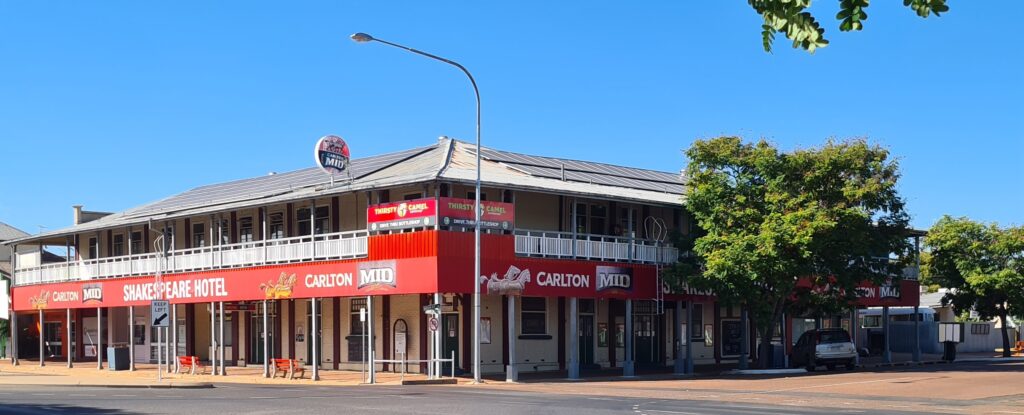The Shakespeare Hotel, then spelt ‘Shakspeare’ after its original owner George Page Shakspeare, was shifted from Pine Hill by rail in 1886. Mr Walter Crust changed the spelling to Shakespeare when he bought the hotel in 1911.
The original building was pulled down and replaced with a larger structure in 1914. It had 40 rooms and 250 feet of verandahs but was destroyed by fire in 1924. Poor water pressure before the town’s water tower was built in 1914 meant there was little chance of saving buildings from fire. In 1925, the council required that new buildings had to be fireproof – made from brick or concrete, but the ruling was often relaxed. The new building code resulted in the present day Shakespeare Hotel which was opened in December 1925.
In the early days it was the hotel of choice for businessmen or commercial travellers. A tie had to be worn at all times. In its glory days the hotel was declared to be equal to any hotel in Brisbane. The first horse races began at Lagoon Creek and finished in front of the Shakespeare Hotel. In the 1936 flood patrons rowed boats into the bar to quench their thirst.
The story of the Shakespeare Hotel provides a backdrop to the story of Barcaldine.
1886 Mr George Page Shakspeare was owner and licensee of the Shakspeare Hotel (note spelling).
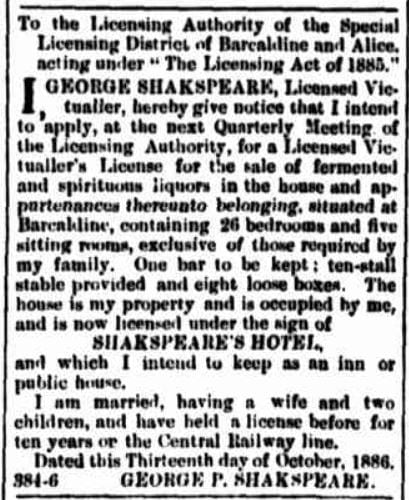
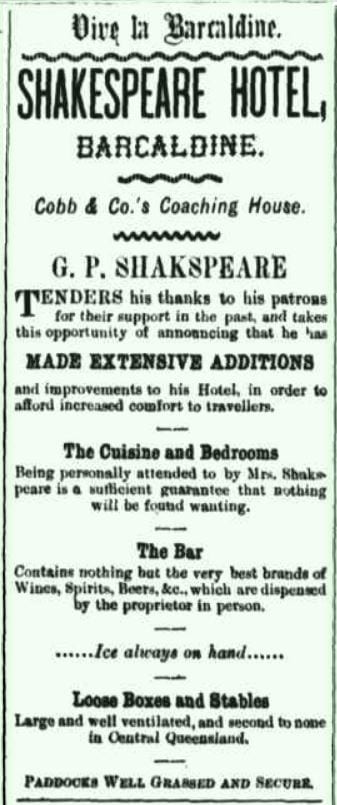
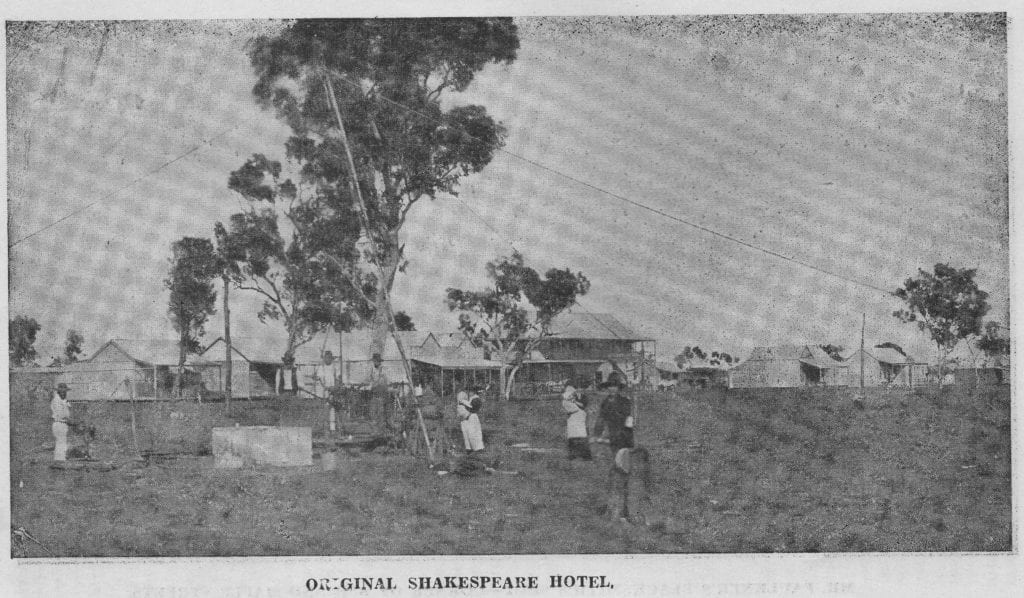
A BARCALDINE HOSTELRY.
MRS. SHAKESPEARE’S HOTEL.
SPLENDID FURNISHINGS
Mention has already been made in this column of the splendid additions that Mrs G P Shakespeare of the Shakespeare Hotel, Barcaldine, has made to her house, and of the fact that it is probably now one of the best appointed hostelries in Central Queensland, a hostelry that in its general appointments will beat favourable comparison with even the best of the houses in Rockhampton.
That this statement is one that is in no way exaggerated may be judged by the fact that every single bedroom in the establishment is supplied with a three-quarter bed, and not, as is usually the case, a single bed: that each bed is furnished with curtain, valance, and spring and kapok mattresses: and that in each room there is a pine chest of drawers, with bevelled glass mirrors, and a marble-topped pine washstand. Again the double bedrooms are all furnished with a 4 ft 6 in brass-mounted bedstead, with spring and kapok mattresses; a cedar chest of drawers, with bevelled glass mirror; and a marble-topped cedar washstand. Added to the very fine furnishings the rooms are large, lofty, and splendidly ventilated – probably as roomy and airy bedrooms as are to be found in the best hotels in Queensland. The suite of apartments reserved for Mrs Shakespeare have already been referred to, and a further description of them may be expected. They are furnished in the most handsome and artistic fashion. Indeed, it is quite a surprise to the visitor from the coast to see in such a far distant western hotel, rooms so beautifully fitted. Again in the dining room there is laid the pretty patterned inlaid linoleum that has recently come into such favour here, and in the hall at the top of the stairs is the cork carpet that is also becoming of very general use. The balcony along the front of the bedrooms and which, by the way, is of the exceptional width of 12 ft, has been completely enclosed with the blinds of the awning canvas – an article that is little known here but generally used in the south. Strewn about the balcony are a dozen or more small tables, lounges, squatter’s and easy chairs. The drapings in the hall and the drapings of the beds are all of silk tapestry and the carpet on the stairs are Brussels of pretty patterns. To further particularise the furnishings would be to weary readers and sufficient has been said to show that the hotel – with its forty-one bedrooms and its sample room rivalling in size any in the western districts – is not only one of the most roomy but one of the best furnished in this part of central Queensland.
There is one point in this connection which should not be lost sight of. That is that the whole of the furnishing was not only done by Messrs Williams and Graham of Rockhampton, but that the whole of the furniture, the curtains, the drapes etc were manufactured on the premises. A fact such as this goes to show that local firms are keeping well abreast of the times, and that they are able to compete with the best of the southern houses which do business in central Queensland, and which constantly have travellers moving about in the western country.
Capricornian, 29 April 1899
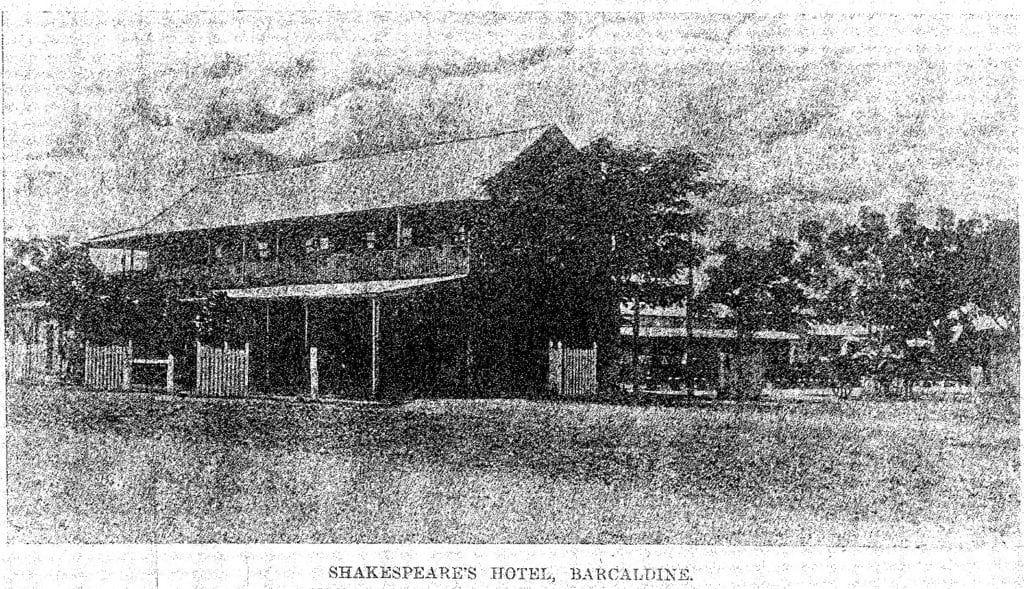
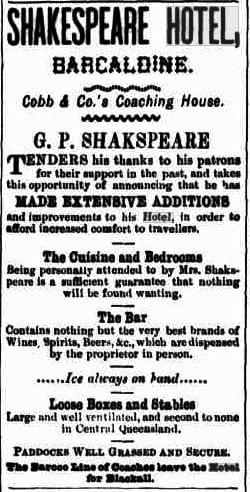

Capricornian, 24 May 1890
A provisional license was approved for Mr. Shakespeare for the Shakespeare Hotel he having cleaned up and disinfected his yards. It is as well to mention here that after the 1st July next no further special licenses will be granted. All hotelkeepers are henceforward required to apply for the ordinary annual licence to commence from 1st July. Applications, with £30 license fee, must be lodged With the Court of Petty Sessions, before the 10th June. The balance of money paid for special licenses will be returned to the applicants. The new order of things is not much relished by local publicans, who preferred applying every six months for their licenses.
Capricornian, 19 July 1890
The Oddfellows brass band, numbering ten performers, turned out on race nights and played a number of selections from the Shakespeare Hotel balcony. The instrumentalists acquitted themselves very creditably, and the master, Mr. W. H. Chandler, may congratulate himself upon the result of his three weeks lasting. The band is likely to become a great acquisition to the town, and will shortly number fourteen members.
Capricornian, 9 August 1890
On Wednesday morning a blackboy was found lying dead in a stable at Mr. Shakspeare’s hotel. Upon inquiries being made and as the result of a magisterial inquest it transpired that the boy, who is only about fifteen years of age, and went by the name of Charlie, came into town the previous day with Mr. Munday, from Rodney Downs. That night he went to a noted opium den, kept by one Jimmy Chong, and smoked several pipes of opium. He afterwards left for the stable and stretching himself on the ground told the stableman he was ‘big fellow sleepy.’ The stableman told the boy to get into a stretcher which was in the loose box, which he did. During the night the stable man heard him breathe heavily. Next morning Mr. Munday went in, and finding he could not make the boy move, fetched Dr. Marks, who thought he would sleep off the effects of the opium. Instead of this, however, the action of the heart became weaker, and at about ten o’clock the lad was found dead. In his evidence Senior-Constable Malone said Jimmy Chong’s hut was a noted opium den frequented by blacks; when they were here both his tracker and gin were quite useless through continued indulgence in opium, and several of the blacks near the town were in a most wretched state through opium smoking. The police magistrate severely reprimanded Jimmy Chong, and regretted there was no law by which he could be punished.
During the 1891 Great Shearers’ Strike, the Shakspeare became the scene of an altercation. The hotel suffered some damage, but the prisoner was eventually taken to the lockup.
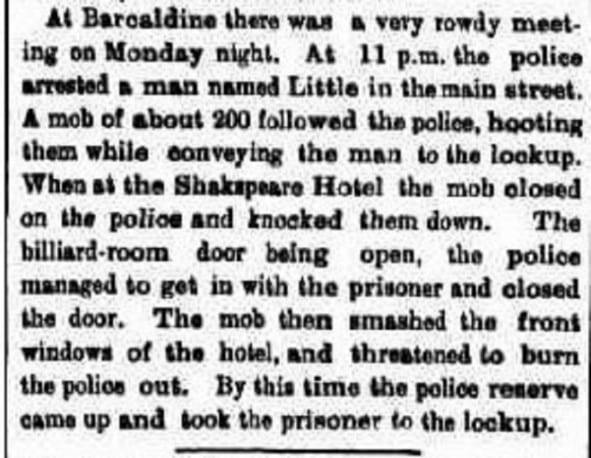
Capricornian, 13 Feb 1897
On Friday evening a number of gentlemen entertained Mr. Oscar Bancke at a wine party at Shakespeare’s Hotel, on the occasion of that gentleman’s leaving for Longreach. Mr. B. McKay was called to the chair, and in a few complimentary terms proposed the health of Mr. and Mrs. Bancke. The toast was honoured in a most enthusiastic manner and was responded to by Mr. Bancke in his usual felicitious and humourous style. Other toasts (interspersed with songs) followed, and altogether a pleasant evening was spent, the gathering winding up with “Auld Lang Syne”.
14 Apr 1900 - application was made by George Page Shakspeare to transfer the licence to his wife Emma Jane Shakspeare. Emma had never held a licence before.
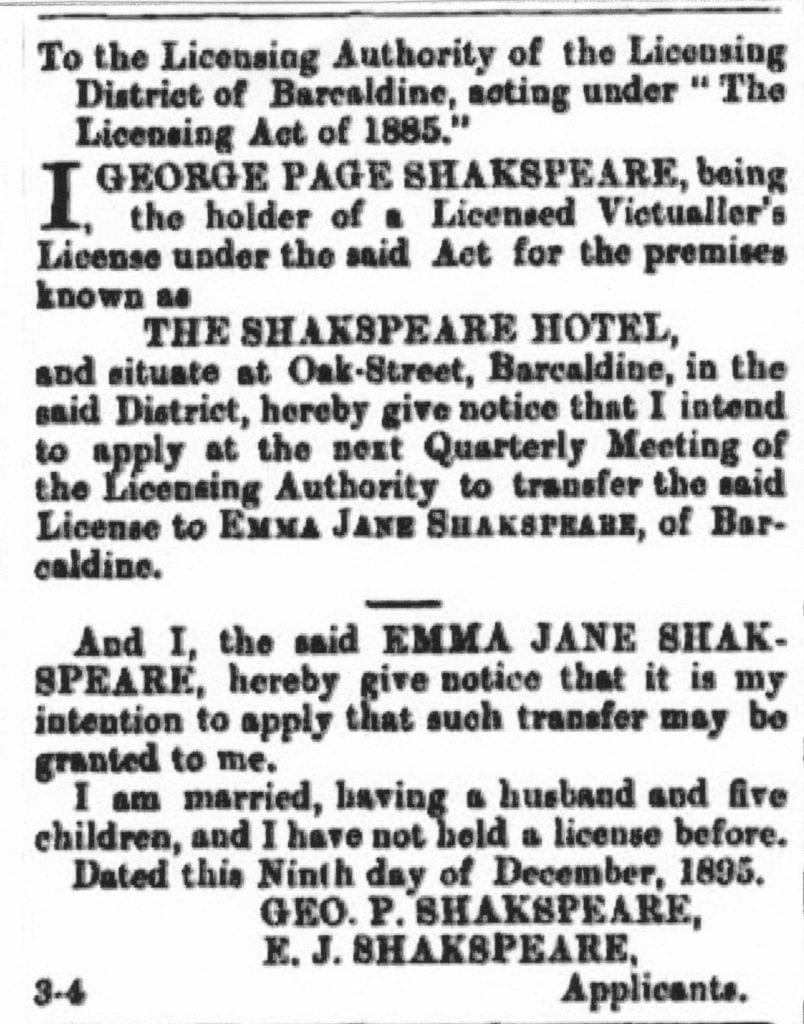
The hotel was often the venue for political meetings. On this occasion, the public meeting considered whether the Central District should be part of the forthcoming Federation Convention. The meeting resolved that the Central District should be represented at the Convention although Queensland would not be represented officially.
Capricornian, 13 Jan 1897
FEDERATION MEETING. A public meeting, to consider the desirability of the Central district being represented at the forthcoming Federation Convention, was held on Thursday evening at Shakespeare’s Hotel. The large room was crowded to excess, and numbers were unable to obtain admission. Mr. James Meacham, who occupied the chair, briefly explained the object of the meeting. He understood that the convention would not meet till June, and there was therefore no need for acting hurriedly in the matter. The other colonies were busily engaged in electing delegates, and he thought it advisable, that, as Queensland could not be represented officially, the people should take some steps to show that this district was desirous of being in some way represented.— Mr. Collins was desirous of knowing before proceeding with the business of the meeting, in what way federation would help the Central district as his notions on the subject were rather hazy. —Mr. McKay agreed with Mr. Collins that some explanation was necessary concerning the merits or demerits of federation, as it would affect this particular district.— Mr. Jones said that half the people did not know what federation meant. He considered it the most important matter that had been brought before Parliament during the past session. The chief object of federating the colonies was that they might combine for the defence of the country in case of war. Australia was looked upon as one of the finest colonies in the world, and would be regarded by any nation at war with England as a choice prize. Australia combined could resist the strongest power. Federation would also give us intercolonial free trade, which would tend to the development of our natural resources. Queensland had nothing to lose, but everything to gain from federation. —Mr. Collins said that after living many years in Queensland he would like, if ever he went to England, to be called an ‘ Australian.’ At present he was only known there as a ‘ Colonist.’ He supposed federation would grant him this boon. He thought the people of Queensland were rather indifferent as to Federation.— Mr. McKay believed that if Queensland had adopted the arrangement agreed to at the meeting of Premiers at Hobart, for the election of Federal delegates, by referendum to the people, nearly all Queensland would have shown themselves favourable to the movement. —Mr. Campbell said they were not there to discuss federation, but to say whether or not this district should be represented at the forthcoming convention. Some people were afraid that if the election of delegates had been left to the people, ‘this division would have elected men representing the views of the Labour party. He thought the matter should be raised above class or political prejudices. If delegates were now sent down, it would affirm the desire of the people to become part of a Federated Australia, and show that it was not the fault of the people, but the action of the Legislative Council; and the supineness of the Government that were keeping Queensland out in die cold. Mr. Jones moved that this meeting affirms the desirability of the district of Central Queensland being represented at the Federal Convention.— Mr. McKay in seconding the resolution said he did not agree with the mover’s fear as to any foreign invasion of Queensland. Our principal ports were well protected by nature with beautiful mud flats and sand banks, which would prove greater obstacles to invasion than stone forts. Where the colony would benefit most by Federation would be in the re-arrangement of the Fiscal and Customs duties, which would enable districts to buy in the best markets, without having to pay toll to the Custom house, or have their trade altered through the hands of the Brisbane merchants. Mr. Campbell moved that the Chairman of this meeting be authorised to communicate with the Mayor of Rockhampton, and the Chairman of the various local governing bodies in Central Queensland, requesting their co-operation in the matter set forth in the first resolution. — Mr. Page, in seconding the resolution, considered it only proper that Central Queensland should be represented at the convention. It was possible that any delegate elected by this district would have no locus standi at the convention, but the choosing of a representative would show that the people were in favour of federation. The failure of the Federal Enabling Bill was due to the Brisbane clique and the indifference of the Government. Both resolutions were carried unanimously and with great enthusiasm. The meeting closed with a cordial vote of thanks to the Chairman. Barcaldine, 27th January, 1897.
The Shakespeare Hotel often appeared in the newspaper accounts of cases being heard in the police courts.
Capricornian, 14 July 1897
At the Police Court on the 8th instant … before the Police Magistrate and Mr. B. McKay, J.P., James McHugh was summoned by Young Gee, a Chinese fruit hawker, for assault. Mr. McCuIlough appeared for the defendant, who pleaded guilty. From the statements of the plaintiff and the police, it appeared that the Chinaman was selling fruit in the bar of Shakespeare’s Hotel, when an altercation took place between the plaintiff and a man named Gladstone. The defendant interfered and set upon the Chinaman, and committed the assault complained of. The Bench fined defendant £1, the witness 15s., and costs of Court 5s., in default one month’s imprisonment. Young Gee summoned Robert Bartley for wilful destruction of property. Defendant pleaded not guilty. Mr. McCullough appeared for the defendant. Young Gee deposed that on the 6th instant he was in the bar of Shakespeare’s Hotel selling fruit; he left his basket on the verandah; he saw the defendant there, and sold him 6p. worth of fruit; defendant paid him for the fruit while in the bar of the hotel he was assaulted by two men named Gladstone and McHugh, and while they were beating him the defendant took his basket and kicked it along the verandah, scattering the fruit all about, witness did not pick up the fruit, as he was so badly hurt he could not see; he did not know what became of it; the value of the fruit was 5p.- Cross-examined by Mr. McCullough: Witness said he could not say how many oranges or apples were in the basket. Alfred Collis deposed that he knew the plaintiff; remembered the row at Shakespeare’s Hotel on the 6th instant; plaintiff was selling fruit; saw him take the basket from his head and deposit it on the verandah; saw the basket kicked over, but could not say positively by whom; some of the fruit was thrown on the footpath, and some rolled into the drain. Cross-examined by Mr. McCullough: some of the fruit was picked up and put into the basket again. Defendant was put into the Witness-box, and deposed that he remembered being in Shakespeare’s Hotel on the 6th instant: there was a row there; plaintiff had some fruit in a basket; the basket was upset accidentally by witness in trying to separate the China man from the man who was fighting with him; the fruit was picked up and put into the basket; the basket was again kicked over, but he could not say by whom, and the fruit rolled into the street; he saw some school children eating the fruit. James Dolan and James McHugh gave corroborative evidence and Mr. McCullough, having addressed the Bench, the Magistrates’, owing to the contradictory nature of the evidence, dismissed the case without costs. On the 10th instant, James Ramsay was fined 5s. or one day in the lockup for drunkenness. On the 12th, Hugh Jackson, for disorderly conduct, was fined 10p. or two days’ imprisonment, and for obscene language was fined 10s. or two days’ imprisonment. Barcaldine, 14th July 1897.
Capricornian, 15 May 1897
On the 7th instant, before the Police Magistrate and Mr. A. McKay, J.P., John Connors was charged with the larceny of two shillings, the property of Bertie Shakespeare. The complainant, a sharp little fellow, seven years of age, stated he was sitting on the verandah of Shakespeare’s Hotel alongside of the prisoner; he had two shillings which was inside his pocket; the prisoner pulled his hand from his pocket, took the two shillings, and walked away; the complainant told Constable Stringer of the loss. William J. Ford, a shearer, stated he saw the prisoner take a two-shilling piece out of the boy’s hand; he then informed the police. Constable Stringer deposed to arresting the prisoner, who bad 2s. 9d. in silver in his possession; he (the prisoner) offered to give the 2s. back to Bertie Shakespeare. Prisoner was found guilty, and sentenced to two months in Rockhampton Gaol, with hard labour.
On one occasion, a visit from the then-Premier, Mr Byrnes, was hosted at the Shakspeare (see the extract from the 1898 Rockhampton Morning Bulletin). There was also a visit from the Governor General and Lady Lamington in 1899.
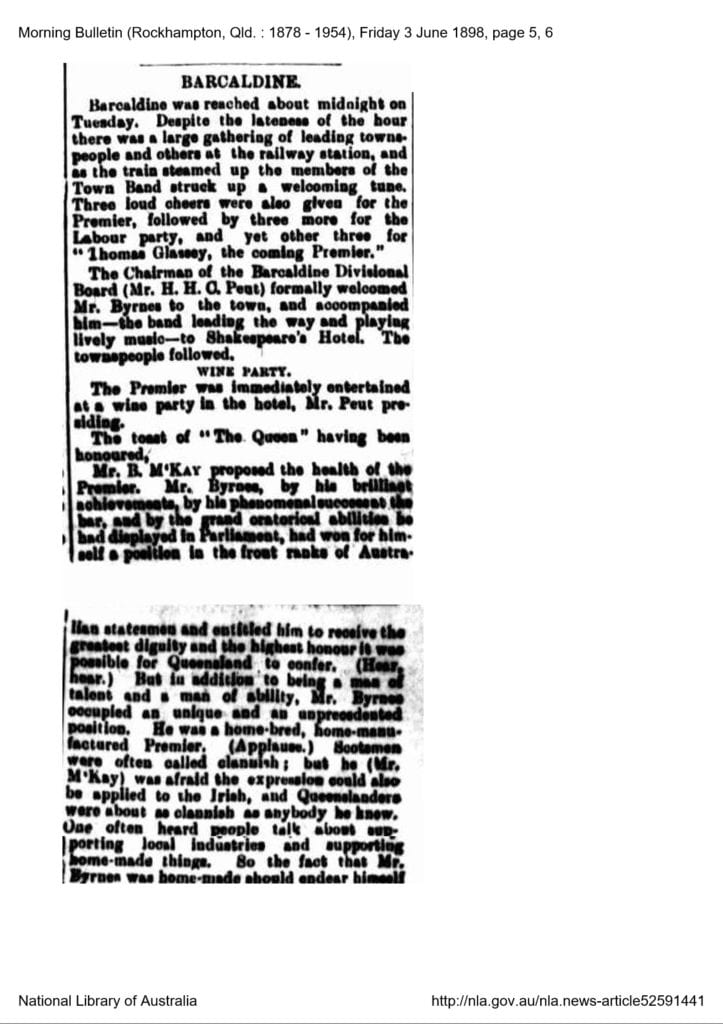
Capricornian, 15 April 1899
His Excellency the Governor, Lady Lamington, and party had a quiet lunch at Barcaldine on Monday, the 10th instant. The Chairman of the Divisional Board (Mr. W. H. Campbell) met the distinguished visitors at the railway station, and escorted them to the Shakespeare Hotel. There was no demonstration, although a crowd of about 100 persons were assembled at the station, and remained outside the hotel during the luncheon interval, after which the party immediately proceeded to Longreach. It is understood that the Governor has accepted an invitation to make a limited stay at Barcaldine on his return from Longreach for the purpose of receiving a welcome from the Barcaldinites, no arrangements for which can be made until the time is fixed.
In 1898, Emma Shakspeare set about making extensive additions to the hotel, adding a large two-storey annexe facing Beech Street.
Capricornian, 18 November 1898
Building is still going on briskly here. Not to be behind the times, Mrs. Shakespeare is making extensive additions to her hotel. A large, two-story annexe facing Beech-street, will shortly be commenced which will give increased accommodation to visitors. This addition will have a frontage of 108 ft. to Beech-street, and will have balconies both back and front. The ground floor will comprise offices, store rooms, sitting-rooms, six large bedrooms, and two sample rooms each 27 ft. by 18 ft., with entrance from the street. The upper story will contain sixteen large bedrooms, all opening on the balconies. This floor will be provided with ladies’ and gentlemen’s bathrooms, linen closets, &c. All the bedrooms are provided with windows and French lights.
G P Shakspeare was one of the local men very involved in horse racing. In the early days, the local races were run on the main street, ending at the Shakespeare Hotel. Later, a race course was built north of the town on the ‘clay pan’.
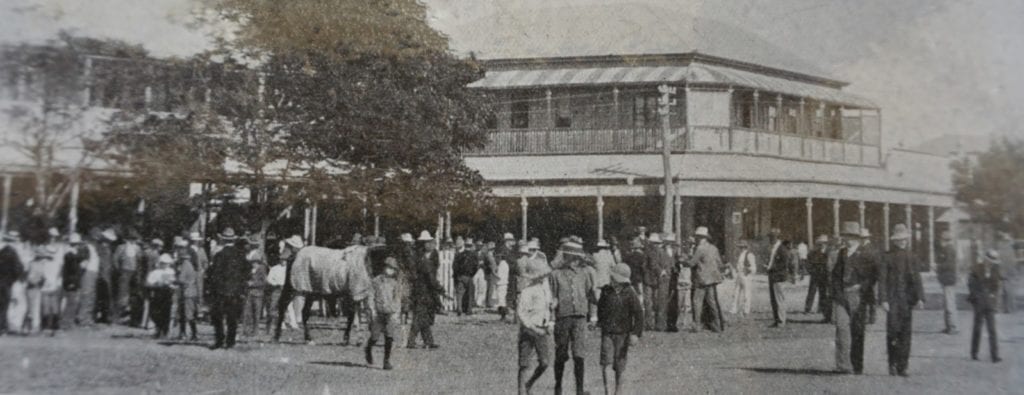
Capricornian, 18 May 1907
Mr. G. P Shakespeare, after two years study, in Melbourne, has passed his final examination in dentistry and has arrived at Barcaldine which is to be his headquarters in the practice of his profession. Mr. Shakespeare is the eldest sort of Mrs. Shakespeare of the Shakespeare Hotel, Barcaldine.
A number of cyclones swept through the town in the early years, causing damage to the Shakespeare Hotel.
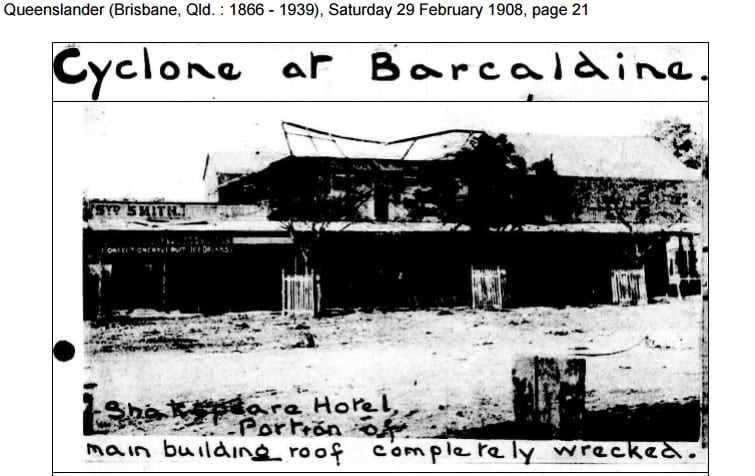
Central Queensland Herald, 5 December 1946
Carpenters are still busy repairing the damage done during the recent gale. Although much of the roof is still off the Shakespeare Hotel a contractor is replacing the old roof with a more up-to-date design, and with more suitable timber.

30 April 1910 – Mrs Emma Jane Shakespeare was the licensee.
In 1911, the Shakespeare family sold the hotel to Mr Walter Crust
August 1912 – Mr Walter Crust was the Proprietor and licensee.
September 1913 – Mr W C Smith, Proprietor of the hotel, announced he was to replace the Oak Street frontage.
In 1914, the original building was pulled down, and replaced with a larger structure with 40 rooms and 250 feet of verandahs.
November 1913
One of the oldest, if not the oldest, buildings in Barcaldine is just now undergoing demolition to give place to a more up to date, substantial and modern structure.
This is the frontage of the Shakespeare Hotel facing Oak Street and Mr. F. H. Peterson, who was the successful tenderer for the contract for the new building, made a start this week on the work of removing the old landmark. A good deal of the timber for the new building had been got ready the past week or so, so it will not be long before there is a show.
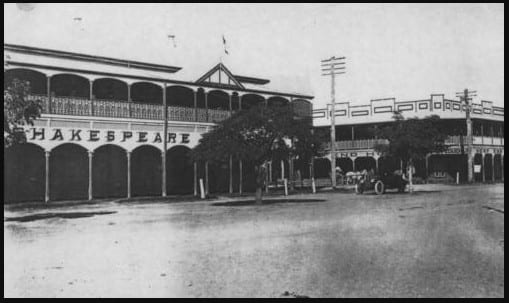
In November 1918, Mrs Mary Ann Dennett was the Proprietor of the renovated hotel.
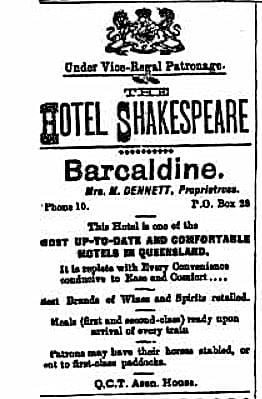
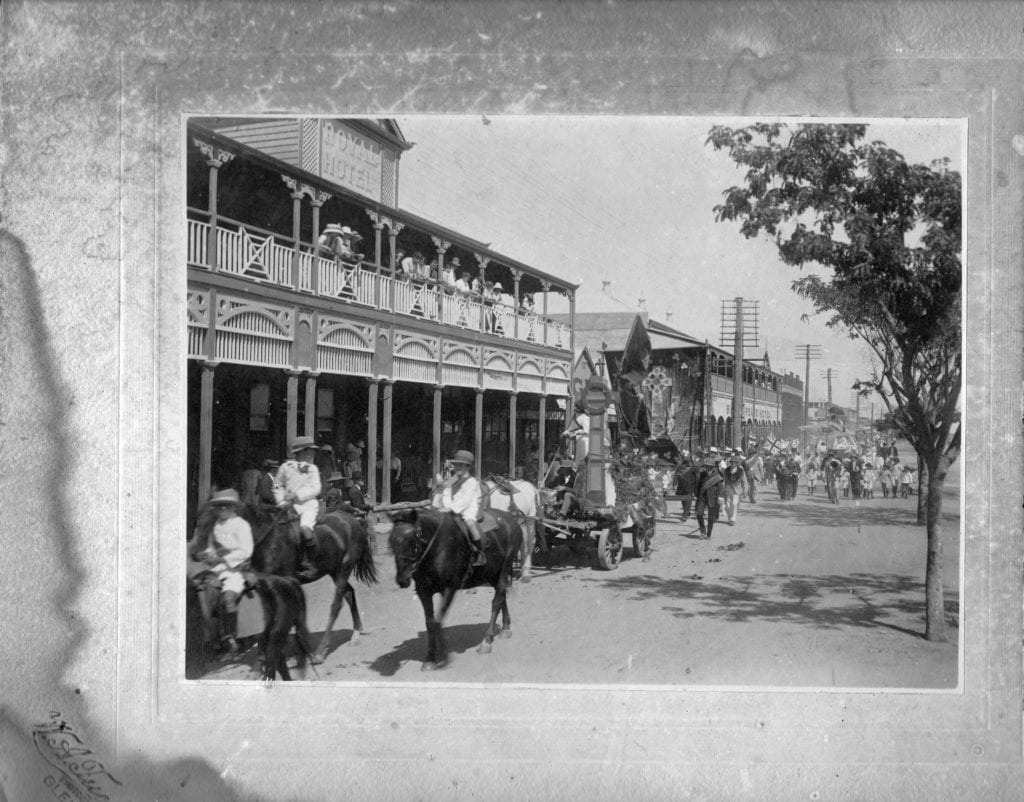
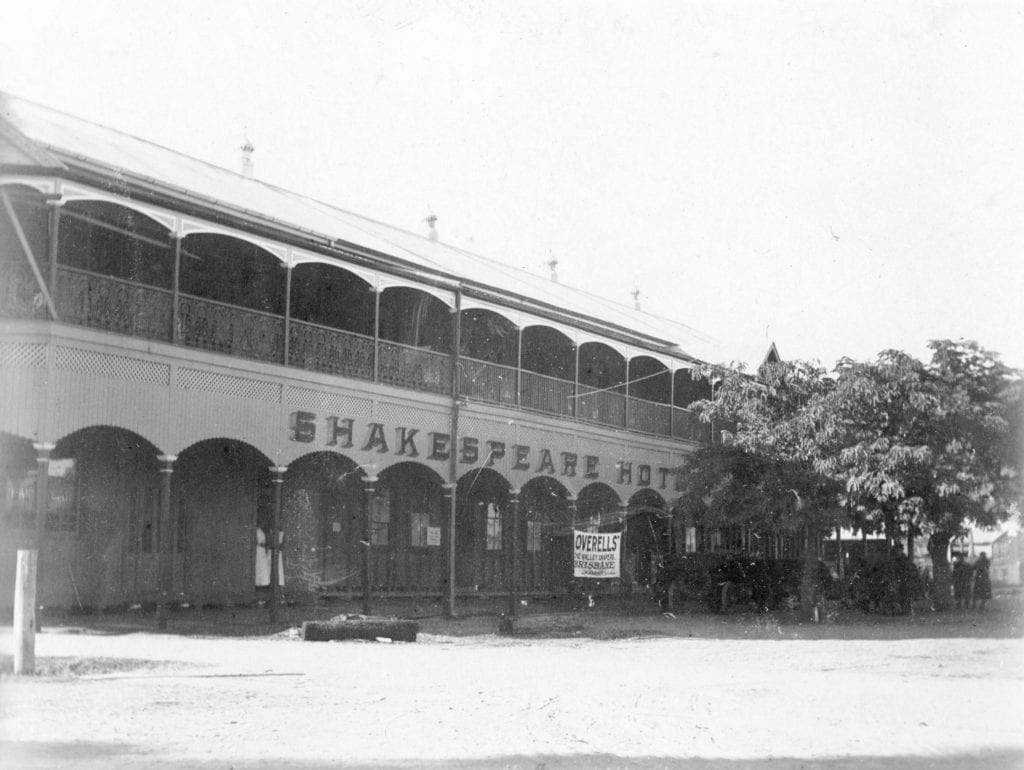
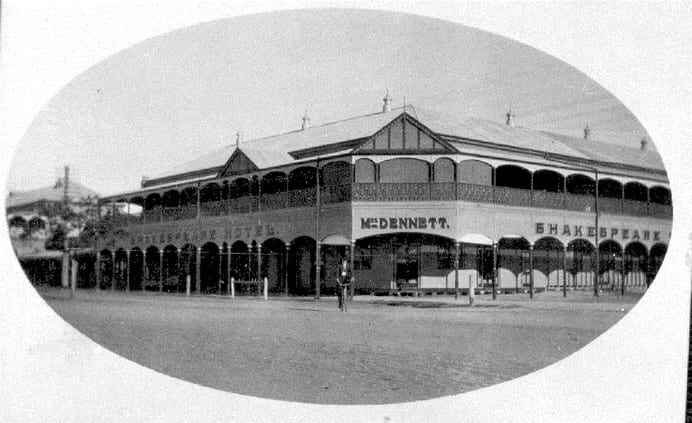
In 1919, Mrs Dennett sold the Shakespeare Hotel to Mr B Culpan.
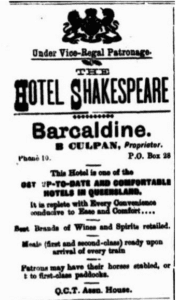
Fire had always been a constant threat to Barcaldine’s buildings especially in the main street. The Shakespeare had been lucky to escape each time. In 1920, when the shift to electricity from gas was still happening, the hotel managed to deal with the crisis itself by turning off the gas and putting out the fire triggered by someone lighting a match.
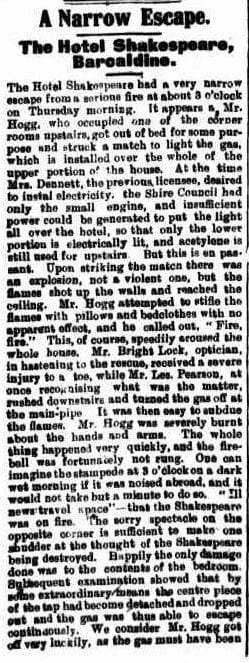
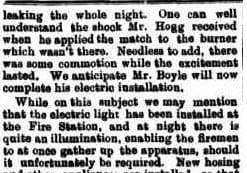

By April 1920, Mr Culpan had sold the hotel to Capt John Phelps Boyle of Rockhampton.
In June 1921, the License is transferred from Capt John Phelps to Mr Robert Anderson.
Western Champion and General Advertiser …, 17 April 1920
SHAKESPEARE HOTEL SOLD. Mr. Edward Hempenstall paid Barcaldine a visit by Saturday’s mail train. That was sufficient, of course. There was some business on hand, and it has transpired since that the particular business was the sale or the Shakespeare Hotel from Mr. Culpan to Captain Boyle of the Normanby Hotel, Rockhampton. Mr and Mrs. Boyle were present in person, and the deal was duly completed, as are all the deals in which this firm figures. Though we “put the acid” on Mr. Hempenstall as to the price, all we got was a smile and the remark that “Barcaldine values are substantially improving,” and from this it may be concluded that the five figure deal showed a decent profit to the vendor. We are sorry to lose Mr. Culpan from the town. Aided by his charming wife and sister-in-law he ran the Shakespeare well, and were it not for him having to undergo treatment right away for that popular complaint appendicitis, he would never have let the old Shakespeare go. But in Captain Boyle and his capable wife (formerly Molly McGrath, a, daughter of that old-time westerner, Bill McGrath, of the Scariff Hotel), Barcaldine is fortunate. Captain Boyle has a host of friends all over the Central District, he is a good sport, as his connection with racing, football, &c., shows, and has a first hand knowledge of the requirements of a first-class hotel. We look forward to a very successful career for the new-comers in Barcaldine and the west. Captain Boyle bought out the whole show including land, buildings, furniture, license, &c., and takes over on the 1st May.
In September 1922, it was sold again, this time to Mrs Barbara Mahoney. Mrs Mahoney was to stay in the hotel until 1946.
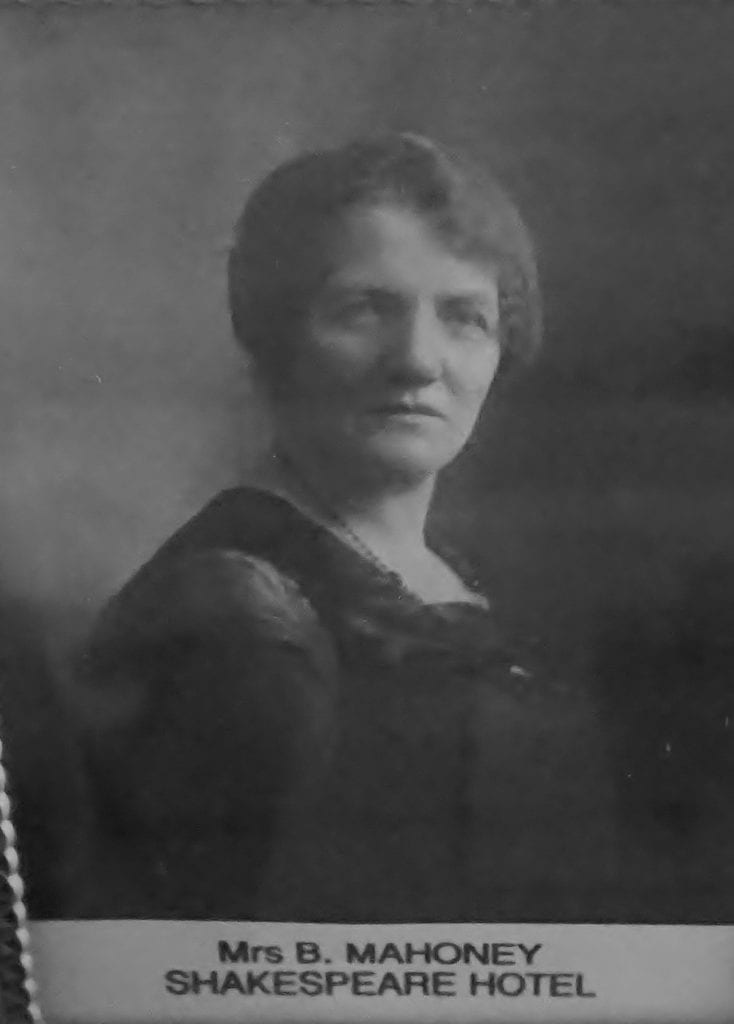
The hotel’s luck ran out in 1924 when it was totally destroyed by fire.
Despite her losses, Mrs Mahoney immediately made plans to rebuild.
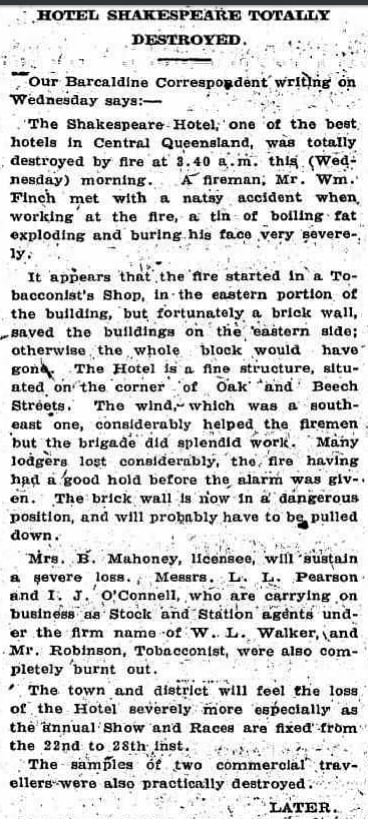
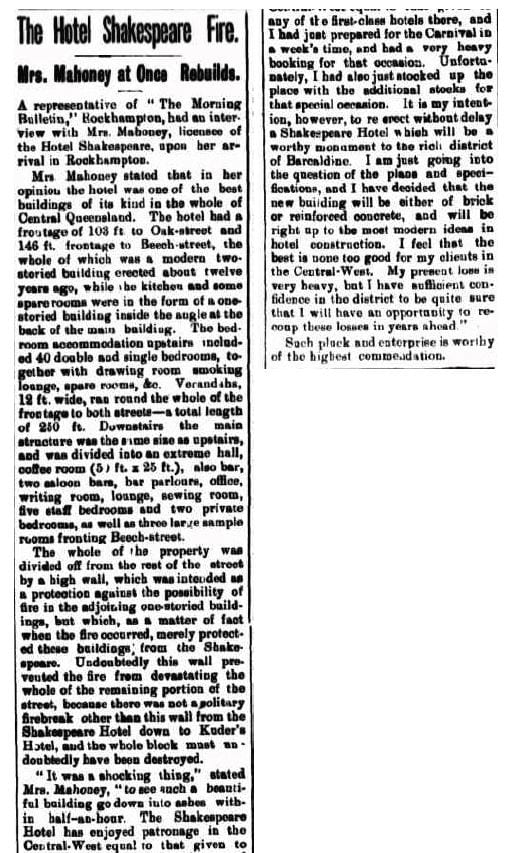
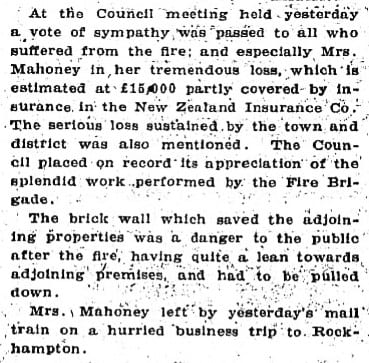
Capricornian, 21 February 1925
The gratifying news was received this week that a contract had been let for the erection of a new Shakespeare hotel, and that building operations would soon be under way. The contractor says that the base will be finished by the end of March and the building completed by the end of June. It will be most gratifying to see the corner occupied again. The new building is to be of brick and concrete.
Capricornian, 21 March 1925
At last a start has been made with the new Hotel Shakespeare. The contractor, Mr. C. O. Gough, Rockhampton returned to Rockhampton on Wednesday last to finalise his arrangements.
Capricornian, 18 May 1925
The foundation having been nearly completed, the building of the new Shakespeare Hotel is going ahead apace. The bricklayers are well on the job, and the front shops are well in shape. Judging by the present outline, the building will be a very fine one.
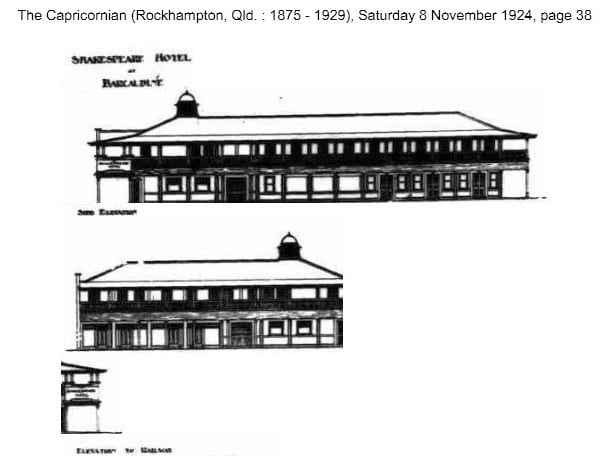
DESCRIPTION OF THE NEW SHAKESPEARE HOTEL 1924
Extract from Capricornian, 8 November 1924
‘In undertaking the erection of the new Shakespeare Hotel, Mrs Mahoney, recognising that wooden buildings in the west are too much exposed to the risk of demolition by fire, has very wisely decided that it should be in brick and reinforced concrete and accordingly, and indeed without delay, gave instructions to the architects to make ample provision in every respect and on the most modern lines, required careful consideration. That this consideration has been given by the architects is evidenced by the plans. The two frontage views herewith will in themselves give a good idea of the dimensions and the character of the new Shakespeare Hotel. Substantial, modern, and ideally constructed for the climatic conditions, will the new premises be…
As the views illustrate, the frontages to Oak and Ash street, 250 ft each way, will be very handsome and imposing. Verandahs, 12 ft wide, will extend along the entire frontages. A special feature of the street frontages will be the balconies, also 12 ft wide, ensuring coolness and comfort for patrons. Such balconies are features of the leading western hotels. …
In the layout on the ground floor of the new Shakespeare Hotel there is an important departure. In the old building there were two shops, then the verandahs, lounge, coffee room entrance, main hall entrance, and the bar. It was felt, however, that since the last hotel was built, the Shakespeare frontages had become too valuable in Oak-street to be used for verandah purposes, so it has been decided to build four shops on this frontage and at the same time maintain the beautiful hall entrance and the bar on the corner. The main entrance to the coffee room will now be from Ash-street [Beech-street?], though the dining room will still be approached by two main lounges from Oak-Street. The bar accommodation allows for a public bar 33 ft long, and two private bars, each 16 ft by 11 ft, together with an adjoining smokers’ lounge, 24 ft by 18 ft. There will also be two other lounges, one 20 ft by 15 ft, the other 32 ft by 25 ft. In addition, there will be a loggia, 30 ft by 11 ft, in front of the coffee room entrance, while the coffee room itself has been enlarged, so that its dimensions will be 50 ft by 30 ft.
An interesting feature will be a paved court adjoining the coffee room, 63 ft by 17 ft. This will be tiled and finished in the most modern way and, being open-air, will be greatly appreciated by guests. The shops fronting Oak-street will each be 33 ft by 13 ft, with plate glass windows. Sample rooms, staff dining-rooms, kitchen, scullery, and other conveniences, will be provided on the ground floor.
The entrance to the floor upstairs will be very striking, consisting, as it will, of roomy stairways, running from both frontages and through both lounges, with a single staircase to the top landing. The upstairs portion of the building will consist of 37 public and five staff bedrooms. Ample upstairs splendid bathroom accommodation will be provided. This is a new feature in the Shakespeare Hotel, as guests will remember that in the building destroyed there was no bathroom accommodation upstairs. The bedrooms will all be very commodious and airy, ranging from 14 ft square to 14 ft by 10 ft with a 6 ft corridor dividing each bank of rooms and with access from every room to the corridor and balcony. Special attention has been paid by the architects to the lighting and ventilation. In both respects, there will be vast improvements on the former arrangements. There will also be lavatory accommodation upstairs’.
It appears that the new building caused some problems for some involved in the Council, as this exchange in the Western Champion shows.
The Western Champion, 18 April 1925. Letter To the Editor.
Sir,-Any public man expects criticism, but I must take exception to the untrue and unfair report of the meeting of the Barcaldine Shire Council held on 8th inst. as appeared in the last issue of your paper. Referring to the trouble that had arisen over the Shakespeare Hotel plan, the report says that I said, “I had drafted the first letter for the Inspector to sign in Ignorance of the facts, and I took the whole blame on my shoulders.” Now that is either a mistake, or a misrepresentation of my remarks. Perhaps the reporter, who happened to be the father of our late Town Inspector was unwittingly biassed. I know he would not deliberately misreport me to cover his son’s mistake. [We should rather think not, Mr. Lyons. – Ed]. I said I was responsible for the drafting of the letter – the letter giving the permit. It could not have gone out in the form in which the Inspector worded it. The letter I drafted was authorised by the Council. I had better briefly explain the position:- the Shakespeare Hotel site is situated In a first-class area, under the Local Authorities Act. This means briefly that all external walls must be fire-resisting material. To oblige the contractor, Mr. Gough, an informal meeting was held on 3rd March, at which he and all the Councillors were present. Mr. Gough told us at that meeting that all the external Walls of the new building were to be of fire-resisting material. Acting upon this the Council authorised its then Town Inspector (Mr. C. J. James, Jnr.) to give a permit to the contractor to go on with the erection of the new building. The permit was drafted by me and issued by the Inspector. At the Council meeting held on 11th March, when the permit came up for confirmation, it was stated that the walls upstairs in Oak- and Beech-streets were to be of wood. To clear up any doubt I sent for the Inspector to attend the meeting. He stated In reply to my question that the external walls upstairs in Oak and Beech-streets were to be of wood. This was a great surprise to most of the Councillors. But, of course, the Council took the word of its Inspector and wired to the contractor refusing to confirm the permit as the Act had to be complied with, etc. Two days later the contractor informed us the walls referred to were not to be of wood, but of fire-resisting material. Those are the facts. The Council acted upon the information of its responsible officer and was misled. Of course, the Council is legally responsible, but I did not say I was taking the blame on my own shoulders. Our Inspector made a lot of fools of us, as on his statement we cancelled the permit thinking there would be a breach of the Act, when everything was in order all the time. The late Inspector’s resignation was discussed for about ten minutes-not one hour as reported. I did say that I would offer no objection to Mr. James withdrawing his resignation, because I think that a man is often the better for having made a mistake-it is a lesson to him -and we all make mistakes.-Yours, etc., ROBERT F. LYONS, Chairman, Barcaldine Shire Council. Barcaldine, 16th April, 1925.
[The above letter was submitted to our reporter, and he states he did not claim to be infallible, but he has always boasted that during a journalistic career of over half-a century he always reported everything in the course of his duty in a fair and impartial manner, without bias or prejudice. And for the “ten minutes” he was not sitting opposite the clock, but it appeared an hour to him. – Ed.]
The Western Champion, 18 April 1925. Letter To the Editor.
Sir,-I have read the above letter which you kindly submitted to me prior to publishing it, and I wish to reply briefly thereto. In reference to the untruth or unfairness of your report of the meeting held on the 8th inst, I can only state that it is without doubt, in essence, correct. Personally I did not like it to be inferred that I was a “scapegoat,” for I have no desire to pose as an “incompetent”, or a “dupe,” even though it is for our highly intellectual city fathers. In any case I do not think that the Council with “mal-intention” placed me in a false position, for I consider myself to a large extent a victim of circumstances. Of course my contention is that I have made no mistakes, and do not have not a suspicion of ‘lapsus memoriae” in this matter, for I can recollect everything that has transpired. The whole difficulty was caused by our conflicting By-law and Local Authorities Act.” In reference to the letter which is a bone of contention, Mr. Lyons is correct in stating that his draft was immeasurably better than mine, and the fact that he drafted it is no more important, than the mere drafting of the letter by any other individual would be. I signed it, and that’s that. The real mistake on Mr. Lyons’ part, I assume, is tills: His authorisation of a letter to be issued from a special meeting convened for an entirely different business purpose. and his taking tor granted that the business completed would be endorsed at the next monthly meetings also, taking it upon himself to write a letter outside the Council when it seems apparent that correspondence should be written by the Shire Clerk in the Shire Office, on official letter paper and proper copies of such correspondence filed for reference if necessary. Mr. Lyons’ explanation of the position is to some extent, correct, excepting that the Council not act upon the information of its responsible officer “and was misled”. I am not splitting hairs, or evading the issue when I state that the Council at its previous meeting stripped me, as Town Inspector, of all my responsibility and authority under the By law. I submitted a few particulars to the special informal meeting on the 3rd March, pointing out that what I had seen of the plan of the Hotel Shakespeare was not in conformity with the By-law. I need not have done this, had I been ungracious to Mr. Gough, who conversed with me for an hour on the previous Saturday. The Council rode rough-shod over my report add gave me certain definite instructions. I was unwilling to write any letters or sign any plans, and I rose at the meeting and expressed my unwillingness. My saying that the upper Storey had wooden walls in Oak and Beech-streets, is beside the issue, for Mr. Lyons knows that the plans and specifications were discussed for two hours, and in the face of my report he gave me certain instructions. I did not apply for re-appointment simply because trouble will certainly arise on every future occasion, unless the By law (which apparently is unnecessary for a first-class block) is remodelled by someone who knows something about buildings. “I fully understand Mr. Lyons’ position and I am sure he mine, and if the whole matter has been fixed up, what useful purpose is being served by unnecessary discussion which in this case may develop into argument and recrimination.-Yours, etc., CHAS. JNR. JAMES, JNR.
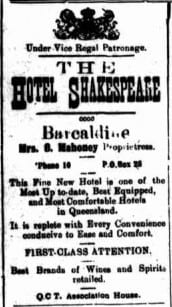
The Telegraph, 11 August 1933
Mrs. Emma Jane Shakespeare, relict of the late George P. Shakespeare, died last night at the age of 71 years. The late Mrs. Shakespeare, who was born at Maitland (New South Wales), was, with her husband, among the first of the early residents of Barcaldine, and for many years conducted the well-known Shakespeare Hotel. About 1912 Mrs. Shakespeare retired from the hotel and subsequently took up her residence on her pastoral property, Stratford, in the Jericho district, where she resided up to the time of her death. She was held in great esteem by a large circle of friends. She leaves a family of three sons — Messrs. George, Bert and Harry Shakespeare — and two daughters, Mrs. Harper (Maud) and Miss Millie Shakespeare.
Fire was not the only natural threat – flooding was also a regular occurrence especially on the Shakespeare corner.
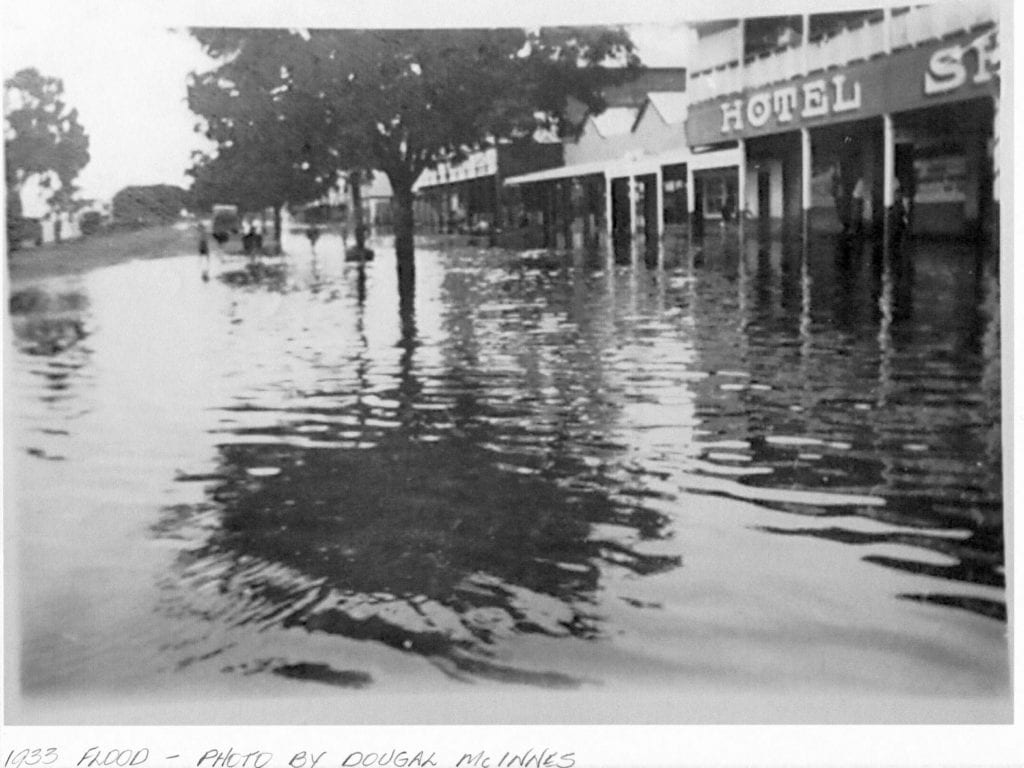
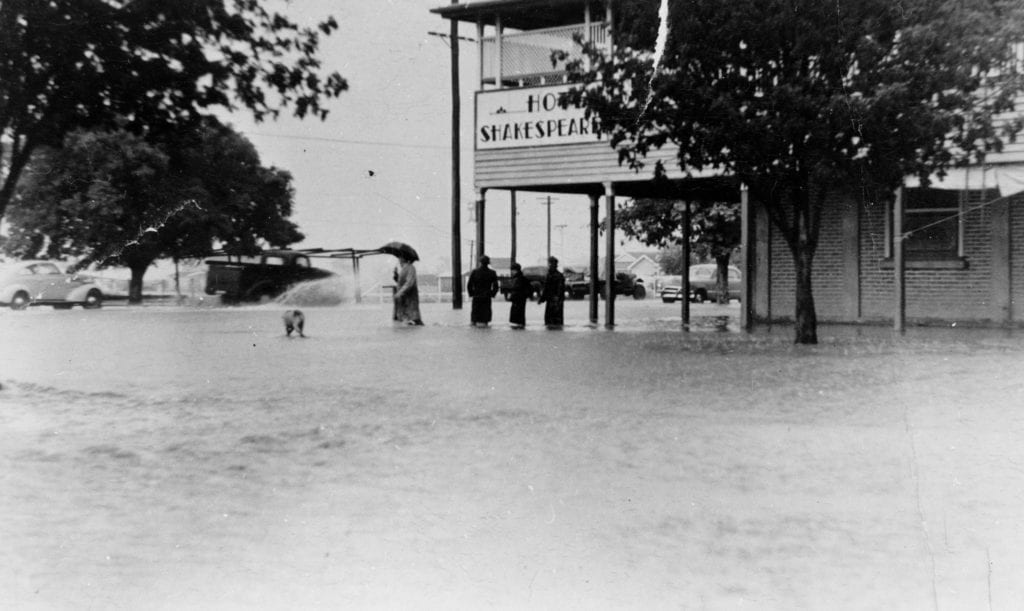
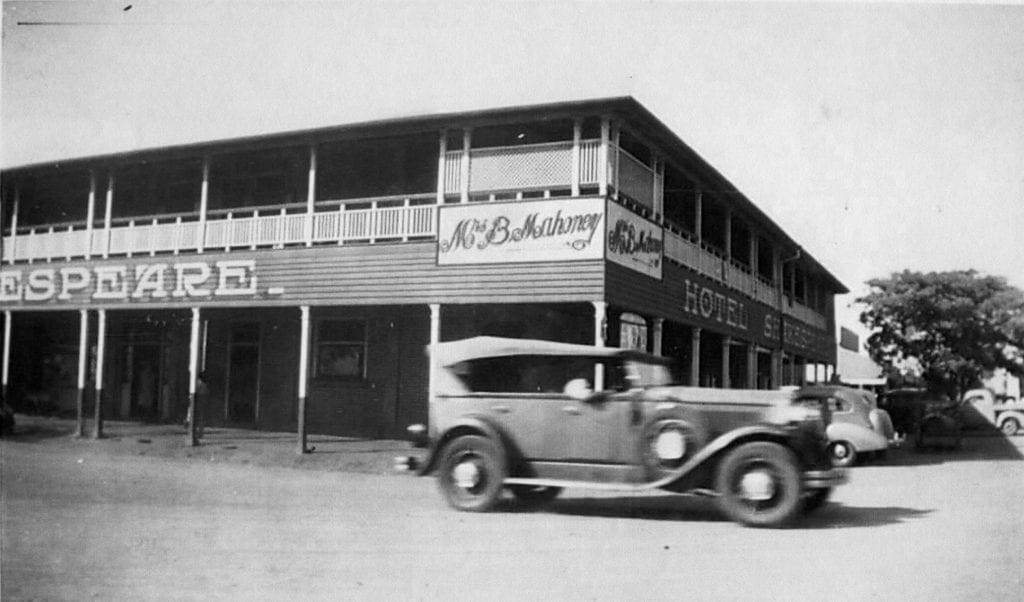
During the Second World War, a US aircraft crashed on the ‘clay pan’. The four servicemen on board survived the crash uninjured. Mrs Mahoney put them up at the Shakespeare for three weeks while their plane was being repaired.
The story was reported in many newspapers after the war, prompted by a letter of thanks from one of the servicemen to the people of Barcaldine.
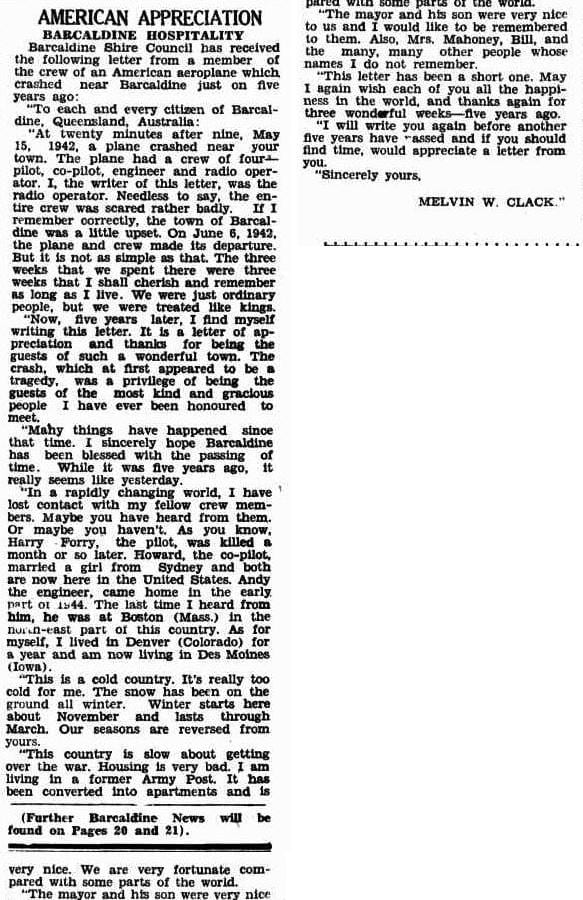
In 1946, Mrs Mahoney sold the hotel.
Morning Bulletin, 25 October 1946
After several years as licensee of the Hotel Shakespeare, Barcaldine, Mrs B. Mahoney has disposed of her interest in this business and expects to leave for the south in the near future. Mesdames E. Symonds, O. P. Hill. W. W. dames E. Symonds, O. P. Hill. W. W. Fraser and Miss A. Murnane were hostesses at a farewell afternoon tea in Mrs Mahoney’s honour. A dainty afternoon tea was served, after which the many guests present extended their good wishes to Mrs Mahoney. She was presented with a leather travelling case and a beautiful handbag.
Central Queensland Herald, 30 Aug 1951
The Shakespeare Hotel was also the centre for another reunion when 50 Nudgee College Old Boys held a reunion dinner. Guest of honour was Mr Johnny Ross, sports master of Nudgee College, who travelled to Barcaldine for the occasion. Old Boys were seated at the table in the order of leaving the college, No 1 position being occupied by Mr R. F. Lyons, who attended the college in 1892.
1958 Mr Edward John Cook, licensee.
1963 Edward John Cook, licensee.
1968 Colin David Stirling, licensee. Patricia Hope Stirling.
1972 Colin David Stirling, licensee. Patricia Hope Stirling.
1977 Colin David Stirling, licensee. Patricia Hope Stirling.
Another flood in 1990 affected the Shakespeare corner once again.
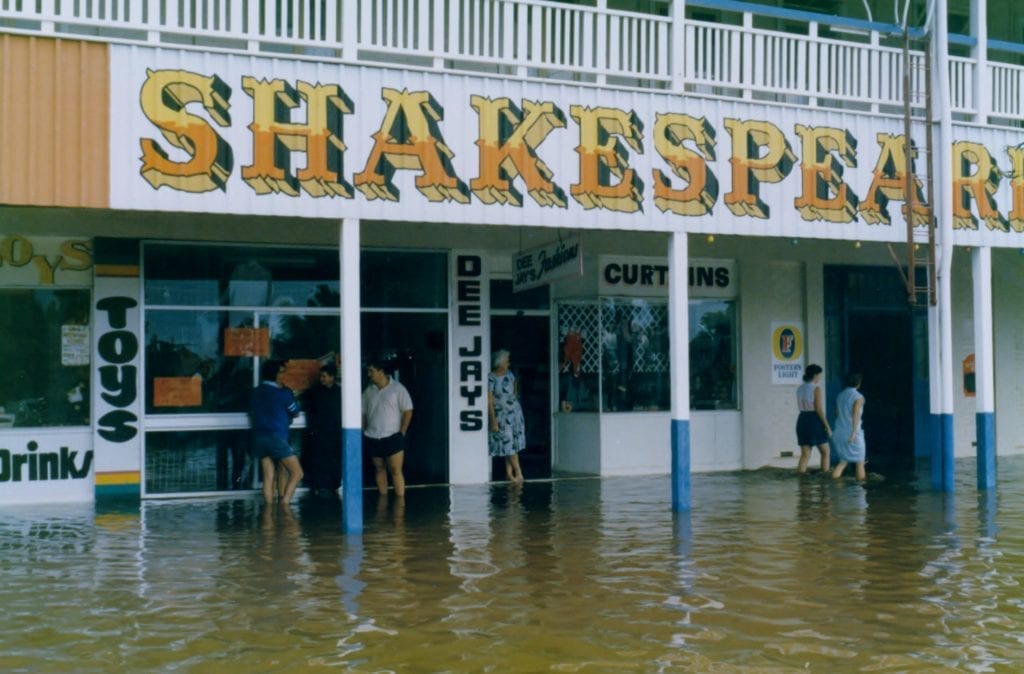
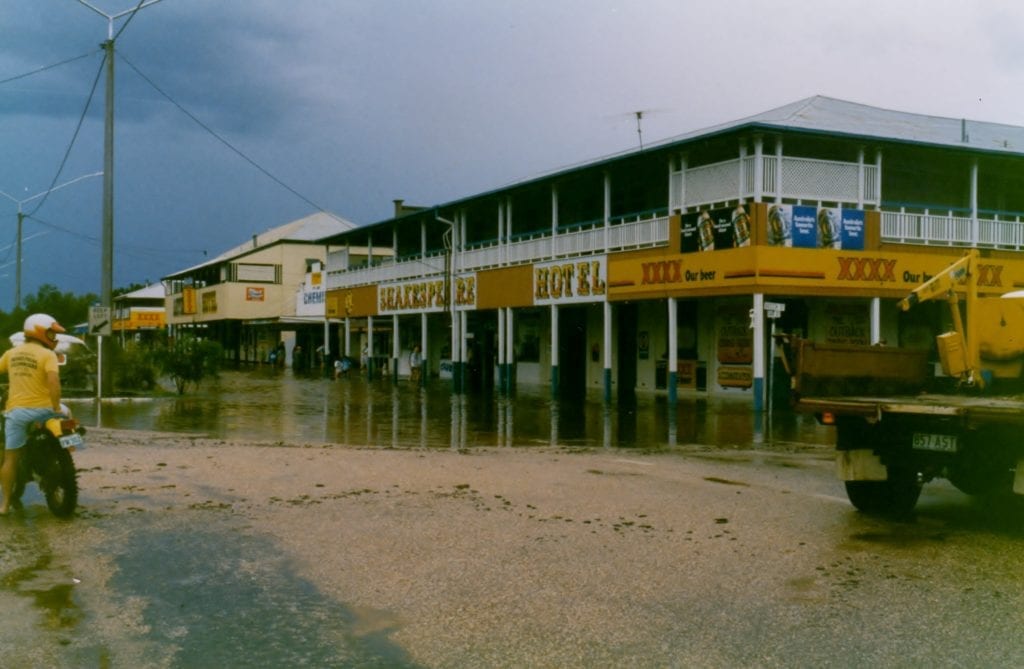
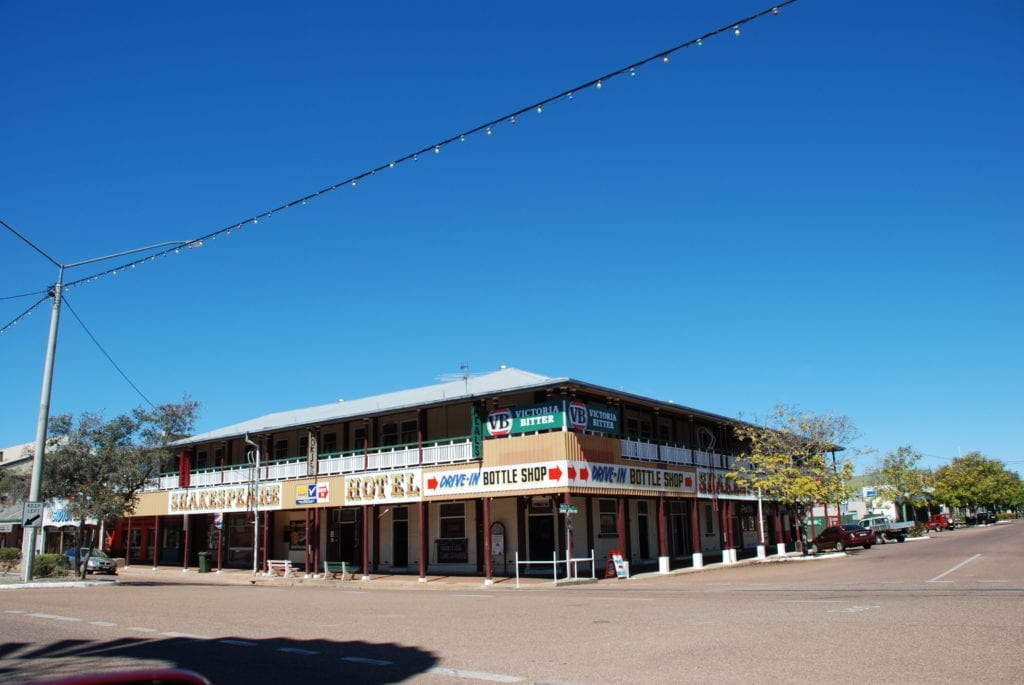
On 4 March, 2014 Waleed Aly interviewed the band ‘Halfway’ in the Shakespeare Hotel.
‘Coming to terms with the grief of being ordinary is the premise of a new album from Brisbane band Halfway.
The setting is a dusty outback drinking hole in the Western Queensland town of Barcaldine, called The Shakespeare Hotel.
The album is called Any Old Love, and is based around one central character whose glory days are over, or perhaps never were.
The band joins Waleed in the Drawing Room for a chat about the pitfalls of concept albums’ (ABC The Drawing Room, 2014).
Listen to the podcast here: Shakespearean Tales from Barcaldine
